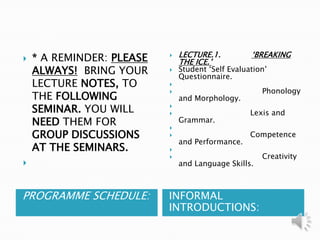
Finished Part 2 With Sound English In International Commerce B Programme Structure .
- 1. PROGRAMME SCHEDULE: INFORMAL INTRODUCTIONS: * A REMINDER: PLEASE ALWAYS! BRING YOUR LECTURE NOTES, TO THE FOLLOWING SEMINAR. YOU WILL NEED THEM FOR GROUP DISCUSSIONS AT THE SEMINARS. LECTURE.1. ‘BREAKING THE ICE.’ Student ‘Self Evaluation’ Questionnaire. Phonology and Morphology. Lexis and Grammar. Competence and Performance. Creativity and Language Skills.
- 2. Seminars will always follow Lectures! SEMINAR. 1. Introduction to Genre: Features – Design and Layout. Function – Objective of Writing. Generic Structure and Word Class. Inflections – Parts of Speech. Researching: from internet and English magazines
- 3. Grammar Structure; Discussing Grammar Lecture. 2. Seminar. 2. Pronouns. Proper Nouns. Verbs. Adjectives. Adverb/Derivatives/Participles/Conjunctive. Discussing Grammar. Pronouns – reflexive/possessive/interrogative. Prepositions (of meaning) Researching ‘People and Places.’
- 4. Grammar Refresh: Lecture. 3. Seminar. 3. . Infinitive verbs. Inflected endings. Irregular nouns/plural. Unaccountable nouns. Introduction to tenses. Adjective forms. Adverb classes. Form and Function. Aspects of the verb. Sentence structure in conversation. Present Simple in different genre forms. Researching ‘Present Simple’ via the media.
- 5. The Linguistic System of English. Lecture. 4. Seminar. 4. Book recommendations (to be given at this lecture) English in the ‘Real World.’ ‘Globish English.’ Word Classes. Discussion Group. Parts of Speech. Preparation for first ‘Student Presentation.’
- 6. Past, Present and ‘The Future. Lecture. 5. Seminar. 5. Talking about ‘The Future.’ ‘Will and ‘going to.’ Introduction to connotations, metaphors and similies. Categorization Group Discussion on: Cohesion. Linking words and phrases. Student Tasking and Categorization. Grammatical Devices. Researching: metaphors in English genre.
- 7. The Metaphor and Idioms. Lecture 6. Seminar. 6. Compare and Contrasting: Different types of genre. Text analysis. Cohesion and Coherence etc. Introducing: non – verbal communication. Terminology. Literal versus the metaphorical. Lexis – Word meaning. Metaphors and Similies. Researching: Descriptive/predictive media.
- 8. Analysis of ‘Word Components’ and their meanings. Lecture. 7. Seminar. 7. . Form and Function. Descriptive/Predictive. : Facts and Fiction: Genre types. Evaluating genre. Discussing type. Researching: Fact or Fiction?
- 9. Complexity of Language. Lecture 8. Seminar. 8. Function – Range – Form. Ambiguity of meaning. Colloquialisms. Onomatopoeic words. Discussing: ‘Social Labels’ Accent and Dialect. Received Pronunciation. Researching: Social Constructs, in Language.
- 10. Group Student Presentation. Lecture. 9. Seminar.9. . ‘Presented by Students.’ Lecturer Evaluation. Discussing: ‘Self Assessments.’ Aims/Objectives. Setting areas of further discussion. Student election of: ‘Top Student.’ Discussion: ‘How the English language is developing.’
Editor's Notes
- Please note: (All research is homework) * A REMINDER: PLEASE ALWAYS! BRING YOUR LECTURE NOTES, TO THE FOLLOWING SEMINAR. YOU WILL NEED THEM FOR GROUP DISCUSSIONS AT THE SEMINARS.
- Relative to linguistics: We peruse syntax or sentence structure and lexicon or word sets we use in different genre layouts or written subjects and themes.
- English Book recommendations to follow: As from the next lecture. ( lecture 4)
- Grammar and lexis definition, word classification and syntax structure in context.
- Here we examine the hypothetical versus the literal sense or reality.
- Use of ‘DESRIPTIVE WRITING’ makes a subject’s FORM much more interesting to the reader. The KEY to DESCRIPTIVE WRITING lies in the technique of ‘THE WRITER, and his/her IMAGINATION – WORLD KNOWLEDGE and MASTERING OF THE CHOSEN LANGUAGE he/she IS GOING TO WRITE IN:
- The system of categorization by type – or Social Labelling, begins at the earliest stage in life – at school.
- STUDENTS TO TAKE NOTES AT ALL TIMES!
